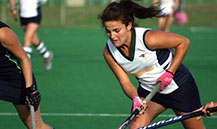 |
Tanya Brits in action.
20 July 2012 |
The University of the Free State (UFS) boasts three hockey players who have been included in the SA u/21 teams that will take part in the interprovincial hockey tournament for seniors during August 2012.
The two Protea players, Izelle Lategang (a second-year B.A. student), and Tanya Brits (a first-year B.A. Arts student), who toured with the Proteas in Europe during May and June this year, are the pride of the university. A further honour for the Kovsie Hockey Club was the naming of Izelle as captain of the SA u/21 team. Nicol Walraven from Eunice Girls’ School is also in the team. Nicol is the sister of Brett Walraven, who plays for both the Kovsies’ men’s first team and the Free State.
For the first time in more than 30 years, the university’s men’s hockey team has produced a SA u/21 player. Richard Pautz, a first-year B.A. student, played for the SA Schools team two years ago and made a return to hockey when he became a student of the UFS this year.
Two other students from this university, Cornelle Botha and Niel Roode, were in the final training group.